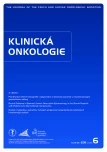-
Medical journals
- Career
The Role of Chemotherapy and Targeted antiVEGF - and antiEGFR-Therapy in Metastatic Colorectal Cancer: a Case Report of Long-Term and Intensive Response
Authors: R. Němeček; R. Vyzula
Authors‘ workplace: Klinika komplexní onkologické péče, Masarykův onkologický ústav, Brno
Published in: Klin Onkol 2011; 24(6): 465-469
Category: Case Reports
Overview
Backgrounds:
Colorectal cancer (CRC) is the second most frequent malignancy in the Czech Republic. Treatment of a metastatic disease is based on application of palliative chemotherapy (fluorouracil, leucovorin, irinotecan, oxaliplatin). When combined with targeted agents against vascular endothelial growth factor (VEGF) and epidermal growth factor receptor (EGFR), it can result in significant and long-term response.Case:
We present a case of a 34-years old man with adenocarcinoma of sigmoid colon (Dukes C) with 5 years disease-free survival (DFS) after primary surgery (in 2002) and adjuvant chemotherapy with FOLFIRI (12 cycles). A solitary relapse in retroperitoneal lymph nodes in November 2007 was treated with retroperiotoneal dissection followed by adjuvant chemotherapy with FOLFOX 4 (12 cycles) and targeted radiotherapy of retroperitoneal area (completed in May 2008). An early relapse occurred one month later (June 2008 – infraclavicular area, thoracic wall and retroperitoneal lymph nodes), patient underwent first line palliative chemotherapy with XELIRI + bevacizumab leading to partial remission (PR) after 3 months and complete remission (CR) after 6 months of treatment. Bevacizumab monotherapy was continued for the next 8 months up to March 2010, when a progression in the lung occurred. After wild-type status was confirmed, KRAS treatment was changed to the second line combination of irinotecan and cetuximab that resulted in nearly complete remission after 6 months and preservation of this remission after the next 6 months of cetuximab monotherapy. All treatments were well tolerated with good quality of life.Conclusion:
Our case demonstrates the current options in the treatment of metastatic CRC. There is a trend to gradually use all the above listed cytostatics in combination with anti-VEGF and anti-EGFR monoclonal antibodies. When administered early, it may provide a significant and long-term treatment response.Key words:
colorectal cancer – bevacizumab – cetuximab
The authors declare they have no potential conflicts of interest concerning drugs, products, or services used in the study.
The Editorial Board declares that the manuscript met the ICMJE “uniform requirements” for biomedical papers.Submitted:
25. 3. 2011Accepted:
27. 10. 2011
Sources
1. Ústav zdravotnických informací a statistiky ČR, Národní zdravotnický informační systém (NZIS), Národní onkologický registr (NOR), [20.12.2007]. Dostupné z: http://www.uzis.cz/info.php?article=368&mnu_id=7300.
2. Dušek L, Mužík J, Kubásek M et al. Epidemiologie zhoubných nádorů v České republice [online]. Masarykova univerzita 2005 [cit. 2008-12-15]. Dostupný z: http://www.svod.cz.
3. de Gramont A, Bosset JF, Milan C et al. Randomized trial comparing monthly low-dose leucovorin and fluorouracil bolus with bimonthly high-dose leucovorin and fluorouracil bolus plus continuous infusion for advanced colorectal cancer: a French intergroup study. J Clin Oncol 1997; 15(2): 808–815.
4. Douillard JY, Cunningham D, Roth AD et al. Irinotecan combined with fluorouracil compared with fluorouracil alone as first-line treatment for metastatic colorectal cancer: a multicentre randomised trial. Lancet 2000; 355(9209): 1041–1047.
5. de Gramont A, Figer A, Seymour M et al. Leucovorin and fluorouracil with or without oxaliplatin as first-line treatment in advanced colorectal cancer. J Clin Oncol 2000; 18(16): 2938–2947.
6. Hurwitz HI, Fehrenbacher L, Hainsworth JD, et al. Bevacizumab in combination with fluorouracil and leucovorin: an active regimen for first-line metastatic colorectal cancer. J Clin Oncol 2005; 23(15): 3502–3508.
7. Saltz LB, Clarke S, Díaz-Rubio E et al. Bevacizumab in combination with oxaliplatin-based chemotherapy as first-line therapy in metastatic colorectal cancer: a randomized phase III study. J Clin Oncol 2008; 26(12): 2013–2019.
8. Cunningham D, Humblet Y, Siena S et al. Cetuximab monotherapy and cetuximab plus irinotecan in irinotecan-refractory metastatic colorectal cancer. N Engl J Med 2004; 351(4): 337–345.
9. Tol J, Koopman M, Cats A et al. Chemotherapy, bevacizumab, and cetuximab in metastatic colorectal cancer. N Engl J Med 2009; 360(6): 563–572.
10. Köhne CH, Lenz HJ. Chemotherapy with targeted agents for the treatment of metastatic colorectal cancer. Oncologist 2009; 14(5): 478–488.
11. Gruenberger B, Tamandl D, Schueller J et al. Bevacizumab, capecitabine, and oxaliplatin as neoadjuvant therapy for patients with potentially curable metastatic colorectal cancer. J Clin Oncol 2008; 26(11): 1830–1835.
12. Chau I, Cunningham D. Adjuvant therapy in colon cancer – what, when and how? Ann Oncol 2006; 17(9): 1347–1359.
Labels
Paediatric clinical oncology Surgery Clinical oncology
Article was published inClinical Oncology

2011 Issue 6-
All articles in this issue
- Plasminogen Activator System and its Clinical Significance in Patients with a Malignant Disease
- Castleman Disease
- Naše päťročné výsledky in vitro testovania chemorezistencie u onkologických pacientov
- The Late Effects in Patients Treated with Allogeneic Hematopoietic Stem Cell Transplantation
- The Role of Chemotherapy and Targeted antiVEGF- and antiEGFR-Therapy in Metastatic Colorectal Cancer: a Case Report of Long-Term and Intensive Response
- Trabectedin Registry
- Positron Emission Tomography in the Diagnosis and Monitoring of Patients with Nonseminomatous Germ Cell Tumours
- Predictive Values of the Ultrasound Parameters, CA-125 and Risk of Malignancy Index in Patients with Ovarian Cancer
- Recent Patterns in Stomach Cancer Descriptive Epidemiology in the Slovak Republic with Reference to International Comparisons
- Long Term Follow up of Eosinophilic Granuloma of the Rib
- HER2 positive T1N0M0 tumours: Time for a change?
- Clinical Oncology
- Journal archive
- Current issue
- Online only
- About the journal
Most read in this issue- Castleman Disease
- Long Term Follow up of Eosinophilic Granuloma of the Rib
- Trabectedin Registry
- Predictive Values of the Ultrasound Parameters, CA-125 and Risk of Malignancy Index in Patients with Ovarian Cancer
Login#ADS_BOTTOM_SCRIPTS#Forgotten passwordEnter the email address that you registered with. We will send you instructions on how to set a new password.
- Career

